On the Poetry of Shogun
2024-04-28
This essay contains spoilers for the 2024 television adaptation of Shogun and also features descriptions of the Japanese ritual of seppuku.
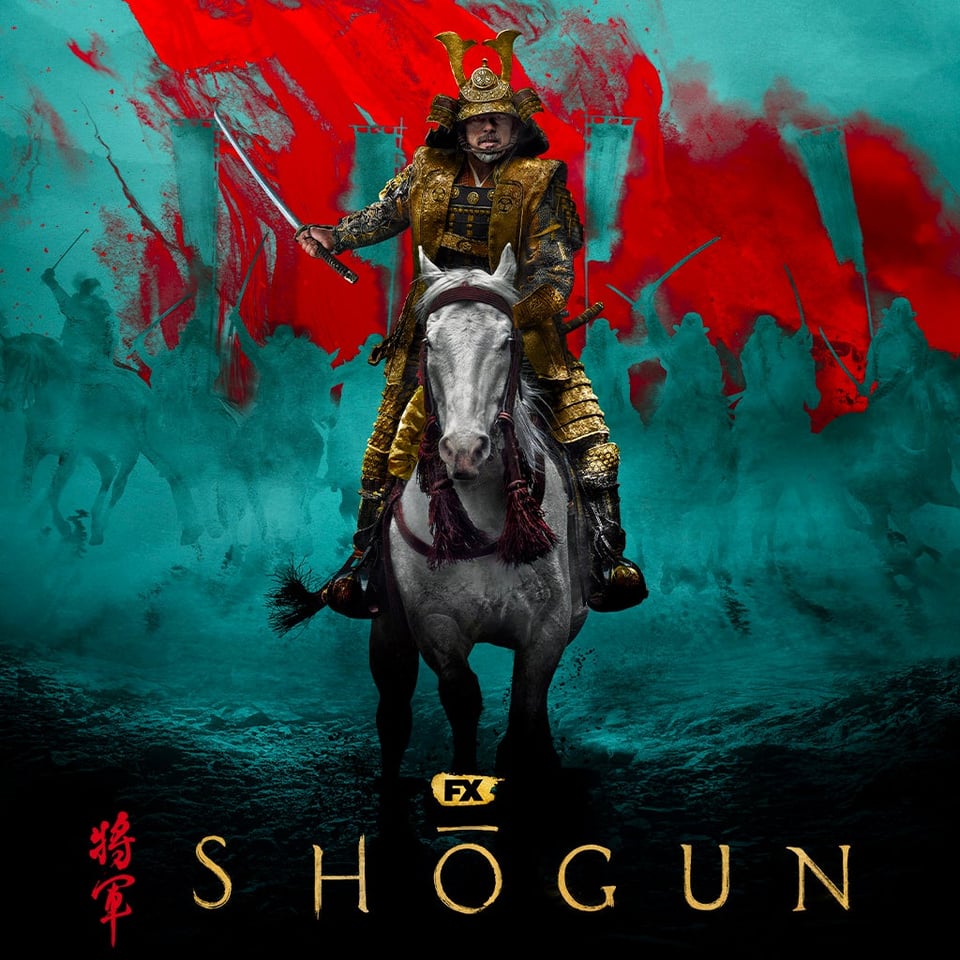
A lot has already been written about the recent FX adaptation of James Clavel's Shogun. With the fragmentation, password sharing crackdowns and rising subscription costs it has often felt like the golden era of prestige TV that began with The Sopranos in the 90s is finally coming to an end. Every time that sentiment reaches a crescendo, another great show comes along to keep at least one monthly subscription from being a necessary casualty of the cost of living crisis.
Shogun ticks a lot of my own personal boxes for episodic entertainment. Feudal Japan setting? Check. Great art design and cinematography? Check. Hiroyuke Sanada's mere presence? Check.
Rather than give a run through of the whole ten episodes, which would be dull, I thought it would be of more interest to give my take on one aspect of the show that I felt worked brilliantly, the characters’ use of poetry.
I've harped on a lot about haiku in previous essays, so I won't repeat my gripes with certain ignorant western takes on the form (I can sum this up with the phrase "your pithy seventeen syllable aphorism isn't a haiku, mate"). Here's a post about Basho and Mario if you'd like to see me go into this in more detail. In the same way that Shogun gets a lot of things right about Japanese culture and character, it also does a great job with the poetry.
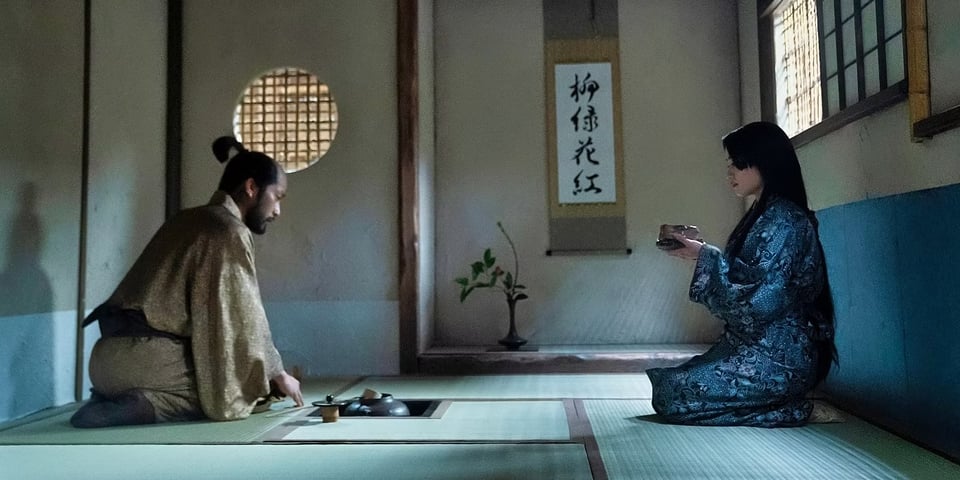
Poetry features more prominently within the second half of Shogun and fits in perfectly with the story as well as in portraying the intrigues and motivations of the characters.
A terse tea ceremony takes place between Mariko (Anna Sawai in a true breakout performance) and her husband, Buntaro (Shinnosuke Abe). In the previous episode, Mariko has been on the receiving end of Buntaro's violent jealousy over her relationship with Blackthorne, a stranded Englishman. Because of this, the viewer is unable to take the ceremony's civility at face value. Mariko, who turns out to be the most skilled poet among the show's characters, improvises the opening haiku,
the scent of plums
detaches from the blossoms and leaves
off into the distance
...before Buntaro offers his own link,
the mind is drawn
where the wind carries the detached scent
There are a couple of ways of looking at these two links. The poems observe proper seasonal imagery, the kigo (seasonal word) in Mariko's haiku is "plum" but she also references blossoms. The context, however, is a woman's need to be apart from her husband and her husband's confession that he cannot let go of his attachment to her. In a culture that refrains from emotive expressions of passions and excess of emotion, the haiku allows nature to speak on behalf of the poet.
Lord Toranaga (Hiroyuke Sanada) has been forced into a humiliating surrender to his rival, Lord Ishida, by an earthquake that killed a great number of his soldiers and a subsequent betrayal from his half brother. Considering Sanada's history of tactical ruthlessness and guile, nobody believes that this surrender is genuine.
His generals, frustrated by this ambiguity, threaten to commit seppuku in order to force a confession of his true intentions. Their protests are shouted down by Buntaro's father, Hiromutsu (Tokuma Nishioka), who is also Toranaga's most trusted ally and friend. Hiromutsu declares before Toranaga and all of this generals that he will commit seppuku immediately out of protest at the surrender. Toranaga remains resolute, despite clearly being on the verge of tears, and Hiromutsu makes good of his threat, choosing his son as a second, who swiftly beheads his father in the moments after he has plunged the dagger into his stomach.
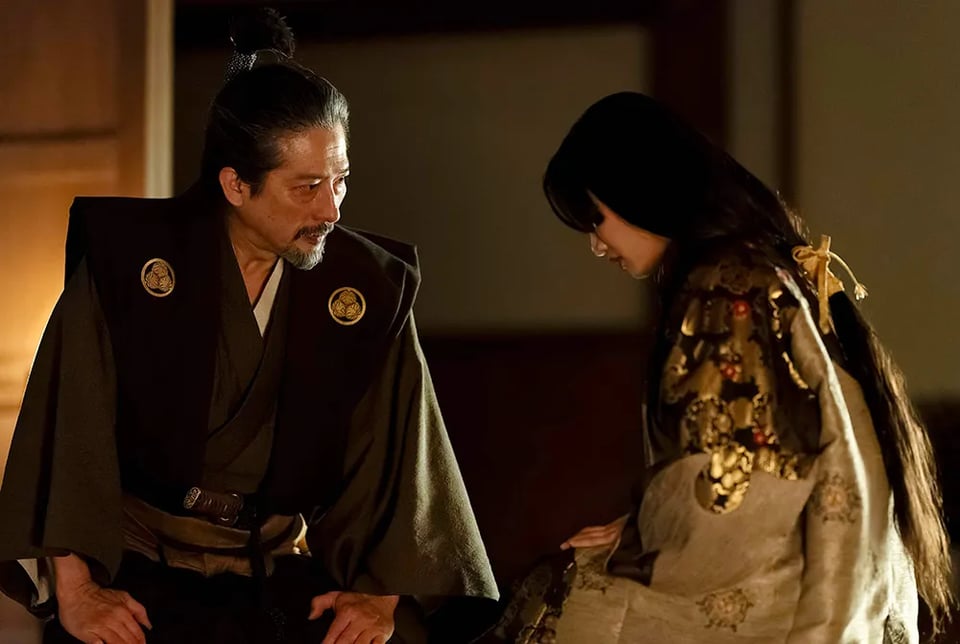
Afterwards, we see Toranaga in his own quarters as Mariko joins him. He is watching the spring rain while remaining on the verge of tears. Initiating a renga, Toranaga says,
the sound of rain on the leaves can be heard
... and Mariko replies,
still more fragile
is the dew of tears on my sleeves
even in springtime
Toranaga is allowing nature to speak on behalf of his grief at losing his closest friend. It also implies how visible his grief was at the moments before and after Hiromutsu's death. Mariko's reply clarifies the implied grief of Toranaga's link, while making the confession her own. Here, she is implicitly recognising their mutual grief while, as a woman, accepting the burden of publicly displaying this grief.
Toranaga then replies,
waiting, the pine tree never withers in winter
Despite the changes in season, the pine tree is resolute, never changing as the world changes around it. Toranaga is also resolute in his convictions – not just in his secret refusal to surrender but also in his need to convince his generals that his capitulation is sincere.
Mariko replies,
if I could use words
like scattering flowers and falling leaves
what a bonfire my poems would make
While Toranaga's link refers to the resolution of his convictions, Mariko's is full of allusions to impermanence. Even her poems, which are recognised by Toranaga as superior to his own, are destined for the flames. In this, Mariko is perhaps recognising her own imminent death and cremation.
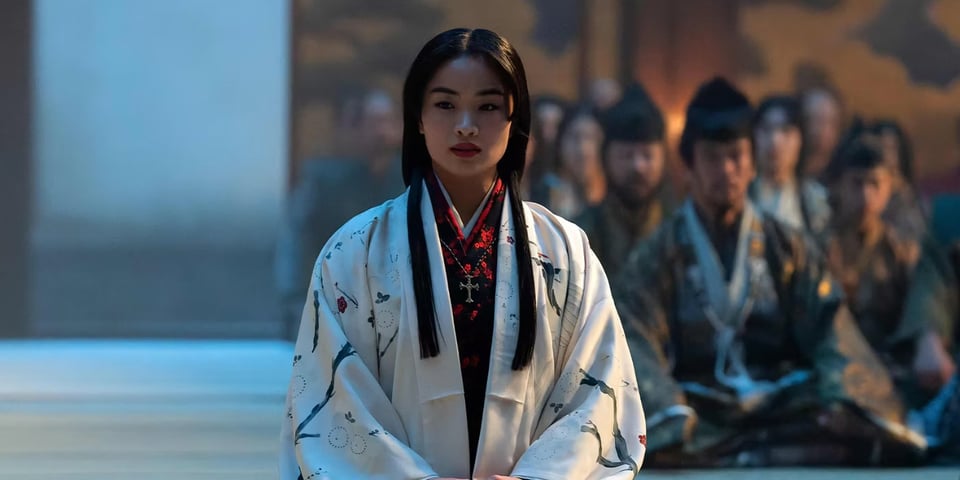
Mariko then, at Toranaga's behest, travels to Osaka with the defecting general Yabushige (played to rogueish perfection by Tadanobu Asana) and her on/off lover, the Englishman John Blackthorne, (Cosmo Jarvis channeling the spirit of a young Oliver Reed). Yabushige, who has been switching alliances throughout the series, is seeking to rekindle his alliance with Lord Ishido in the wake of Toranaga's surrender. Mariko also presents herself to Ishido and his fiancée, Ochiba (Fumi Nikaido), the mother of the young heir to the dead Shogun.
Ochiba reminisces about her childhood friendship with Mariko and invites her to offer an opening haiku for a poetry competition. After offering the verse (which we shall look at in a moment), Mariko causes great consternation by stating that she will not be present for the competition as she will be returning to Toranaga the next day and will bring his wife with her. This is seen as an act of insubordination, as all of Toranaga's family and allies in Osaka (including Mariko by merit of her presence) are effectively there as hostages. While this fact is not explicitly stated, it is nonetheless implicitly understood to be the case.
Here is the poem that Mariko offers,
while the snow remains
veiled in the haze of cold evening
a leafless branch
Ishido is quick to express his appreciation of the poem ("Excellent! If a little bleak.") But Lady Ochiba is able to pick up on the many implications and details that Ishido does not recognise. Firstly, the poem commits the cardinal sin of using an inappropriate kigo (Yabushige later expresses his bemusement, "What a terrible poem! Who writes about leafless branches in the spring?") The fact that Ishido did not recognise this demonstrates how his mind is not engaged with what is in front of him, an error that Toranaga would never make.
The intimation that snow remains could still be appropriate for early spring, but it also points out that the seeming transition of power from Toranaga to Oshida is not in itself complete. For the rest of the episode, Mariko's actions in attempting to leave Osaka and her subsequent resolution to commit seppuku, continue to force Ishido's hand and undo all the subtle and implicit bases of his power.
Ishido relents in the face of Mariko's imminent death and supplies permits for her to leave the city with the other hostages. He then accepts Yabushige's offer and commits him to assisting shinobi assassins in a nighttime attack on the quarters that Mariko and the hostages are staying in. Mariko is killed as a result.
It turns out, by the end of the series, that Mariko's visit was the main thrust of the Toranaga's attack on his rival (referred to as Crimson Sky). Its true intent was to undermine Lady Ochiba's alliance to Ishido and therefore deny him the support of the heir's great army.
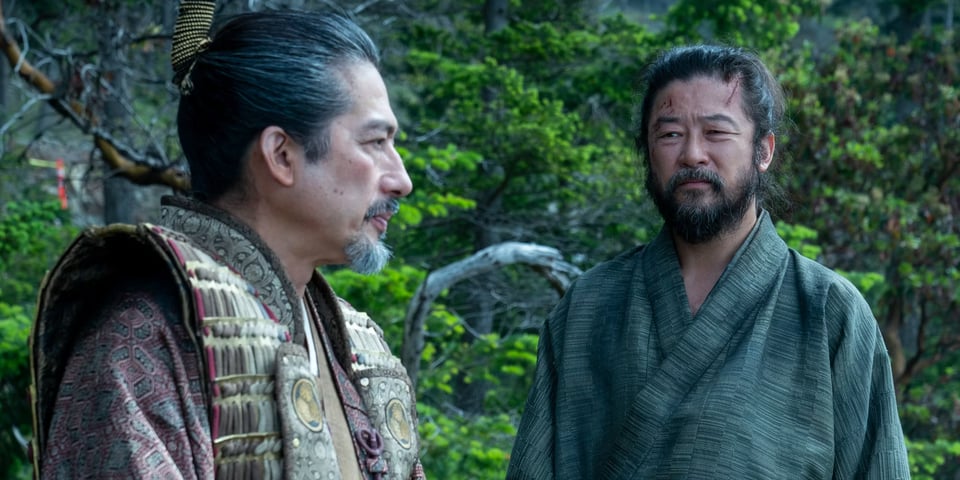
In the aftermath of Mariko's death, Yabushige is consumed with remorse as he was assured that she would not be harmed. Yabushige confesses his treachery to Toranaga who commands him to commit seppuku before dawn and agrees to second him. In the moments before his final conversation with his Lord, Yabushige says farewell to his nephew and heir, offering his death poem,
my dead body
don't burn it, don't bury it
just leave it in the field
and with it, fill the belly
of some hungry dog
The death poem has a long history in Japan, with roots in the countries Shinto tradition as well as in its many schools of Buddhism. While earlier Japanese death poems offer supplications to the gods and references to the Western Land of the spirits, later poems have a tendency towards bathos. In Zen buddhism and the haiku tradition, nobody really leaves nature. While monks would treat the death poem as a chance for a last transmission of teachings, warriors would often compose a death poem before battle and keep it on their person in the hopes of its retrieval in the event of their death.
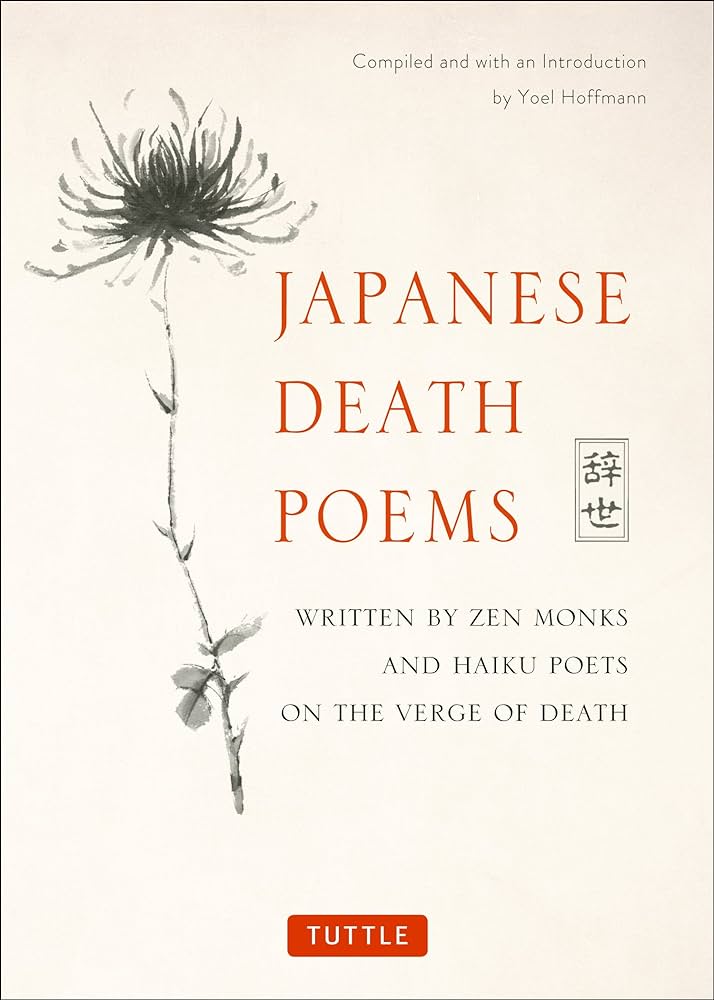
Yabushige's poem leans heavily into bathos, but also feels sincere and without affectation. The dogs that feed on corpses in fields are as much a part of nature as the usual sublime or ephemeral natural references such as hawks or butterflies. The poem also recognises Yabushige's shame at his actions and treacheries, often born of his survivalist instincts.
In the last moments before sunrise, sat at the top of a cliff after a conversation in which Toranaga finally reveals his motives and the expected outcomes for his actions, Yabushige doesn't even open his robe before plunging his dagger. With one arc of Toranaga's sword, Yabushige's head and body are sent plunging onto the waves, honouring his wish for an unceremonious return to nature.
One of the things I enjoy most about the role poetry plays in Shogun is how it is presented as an intrinsic part of a culture. In the same way that being a skilled sonneteer could advance a member of the Elizabethan court in Renaissance England – skill with haiku, renga and tanka came into play within the feudal Japanese system. If anything, it was Lord Ishido's lack of poetical skill that proved his ultimate undoing.
I also liked how poetry in Shogun represents the art of the implicit. It is not an exercise in bearing one's soul, nor is it crudely allegorical. In his final conversation with Yabushige, Toranaga says, "I don't control the wind. I only study it". Poetry in Shogun is not about being overwhelmed by emotion or asserting the primacy of the self. It is born of an awareness, a tempered curiosity, that observes how nature echoes the hidden connections between things.
Thanks for reading this
I almost didn't write this essay. This was because of a few factors all coming together to swirl into a perfect tarry cocktail of I-can't-be-f*cked-ness. Don't worry, the post you just read isn't a figment of your imagination. I took a neurofen and stopped being such a baby.
Factor number one was that I'd already recorded a video on this same subject for my YouTube channel which will go up around midweek. Before this, I was posting my essays on Fridays and then recording the videos on Saturday mornings. What I realised, motivation-wise, is that it's a lot harder to write a piece on the same subject after you've recorded a video on it, especially when the videos tend to get more traction and subscriptions than the essays.
https://www.youtube.com/@NiallOSullivan
Secondly, you may have noticed my spiel at the end of each essay about how I give the essays freely but that people could still subscribe for a monthly sum of their choosing? Well, I got a few paid subs but, according to the dashboard, they all quit their subs after a month. Only, that wasn't the case! It turned out that the "monthly amount of your choosing" sub option didn't seem to offer recurring subscriptions. So people were subscribing but that subscription was only lasting for a month. I tried fixing this, but it was a lot trickier that simply toggling the "recurring" option to "on". I also didn't want to inflict a recurring sub onto anybody that just wanted to do a one off payment. So, with this in mind, I've activated two fixed options (£5/month or £50/year) and the pay-what-you-like option is no more. Because this kind of business tends to make me feel a bit icky, I thought I would add a little something to the deal.
Readers might remember that I once posted poems to this newsletter as well as essays, as well as the odd short narrative pieces that I referred to as "yarns". Well, I have decided that I will stick to my intentions of keeping the essays free for everybody but I will also publish a weekly piece of creative writing and this will go out as an extra weekly email to paid subscribers. I've amassed a fair few since I last posted one, so there's enough to keep me ticking over for a while.
To sweeten the deal, here's a short poem I wrote a little while back but didn't publish anywhere. Have a good one!
VOIDTRAIN
the hills of sydenham and the jittery willow between us & the block of flats shaped like a ship
conspire to make it feel like this cramped living room is just a floating box
& i'm reminded of a game demo i played where the world had been shattered into pieces bar a train track that wound through groundlessness
& my avatar flung out a grapple hook to reel in debris for crafting and other little-god things
(when you live above the ground level does that make the floor beneath your toes a kind of ground?)
the smallness of this box no longer sinks my spirit for the world beyond it can never be grasped
and yearning for a bigger floating box is just another form of grasping
Don't miss what's next. Subscribe to Rusty Niall:
Add a comment: